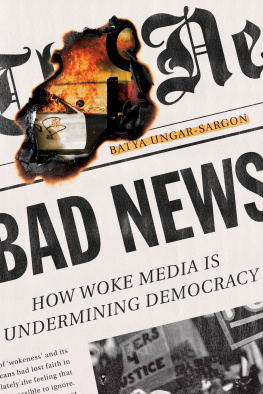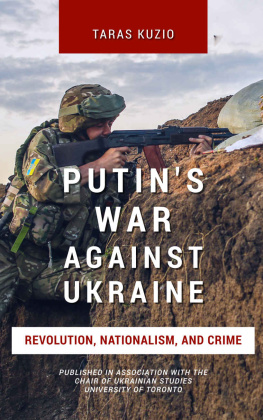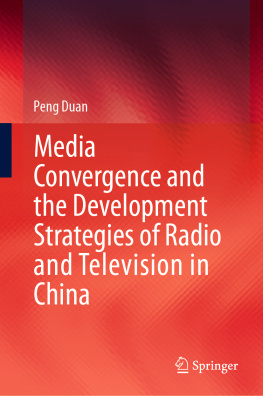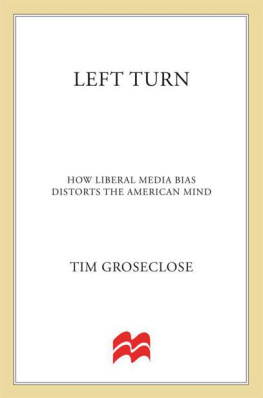
Russias Liberal Media
This book examines the challenges and pressures liberal journalists face in Putins Russia. It presents the findings of an in-depth qualitative study, which included ethnographic observations of editorial meetings during the conflict in Ukraine. It also provides a theoretical framework for evaluating the Russian media system and a historical overview of the development of liberal media in the country. The book focusses on some of Russias most influential liberal national news outlets: the deadliest newspaper Novaya Gazeta, Russias last independent radio station Radio Echo of Moscow (Ekho Moskvy), and US Congress-funded Radio Free Europe/Radio Liberty. The fieldwork included ethnographic observations of editorial meetings, long interviews with editors and journalists, as well as documentary analysis. The monograph makes theoretical contributions to three main areas: (1) media systems and terms of reference; (2) journalism: cultures, role conceptions, and relationship with power, culture, and society; and (3) mediatisation of conflict and nationhood.
Vera Slavtcheva-Petkova is a Senior Lecturer in Communications and Media Studies at the University of Liverpool, UK. She is the author of Global Journalism: An Introduction (with Michael Bromley).
Routledge Research in Journalism
14 Journalism and the Philosophy of Truth
Beyond Objectivity and Balance
Jesse Owen Hearns-Branaman
15 Democratizing Journalism through Mobile Media
The Mojo Revolution
Ivo Burum
16 News Across Media
Production, Distribution and Consumption
Edited by Jakob Linaa Jensen, Mette Mortensen, and Jacob rmen
17 Pursuing an Ethic of Empathy in Journalism
Janet D. Blank-Libra
18 Journalistic Role Performance
Concepts, Contexts, and Methods
Edited by Claudia Mellado, Lea Hellmueller and Wolfgang Donsbach
19 News of Baltimore
Race, Rage and the City
Edited by Linda Steiner and Silvio Waisbord
20 The Trump Presidency, Journalism, and Democracy
Edited by Robert E. Gutsche, Jr.
21 Russias Liberal Media
Handcuffed but Free
Vera Slavtcheva-Petkova
For a full list of titles in this series, please visit www.routledge.com.
First published 2018
by Routledge
711 Third Avenue, New York, NY 10017
and by Routledge
2 Park Square, Milton Park, Abingdon, Oxon OX14 4RN
Routledge is an imprint of the Taylor & Francis Group, an informa business
2018 Taylor & Francis
The right of Vera Slavtcheva-Petkova to be identified as author of this work has been asserted by her in accordance with sections 77 and 78 of the Copyright, Designs and Patents Act 1988.
All rights reserved. No part of this book may be reprinted or reproduced or utilised in any form or by any electronic, mechanical, or other means, now known or hereafter invented, including photocopying and recording, or in any information storage or retrieval system, without permission in writing from the publishers.
Trademark notice: Product or corporate names may be trademarks or registered trademarks, and are used only for identification and explanation without intent to infringe.
Library of Congress Cataloging in Publication Data
CIP data has been applied for.
ISBN: 978-1-138-23728-5 (hbk)
ISBN: 978-1-315-30019-1 (ebk)
Typeset in Sabon
by codeMantra
First and foremost, I would like to thank my family my parents Yordan and Zoya; my husband Tsvetan; my children Zoya, Nadezhda, and Jordan; my sister Desislava, her husband Kostadin, and my niece Darina; and my mother-in-law Nadezhda for their unwavering support and for putting up with me during all those years.
This project would not have been possible without the financial support of the University of Chesters International Research Excellence Awards Scheme funded through Santander Universities. Special thanks are due to my former colleagues in the Department of Media at the University of Chester and especially my friends from the Journalism programme there as well as the Research and Knowledge Transfer Office. I took inspiration for this book from my colleague Dr Simon Roberts who published a monograph on journalism in the former Soviet republics, so I am especially grateful to him and to my dear friend and colleague Ato Erzan-Essien. I would also like to thank my colleagues at the Department of Communication and Media at the University of Liverpool for their support over the last few months of this project. I am also grateful to the Faculty of Journalism at Lomonosov Moscow State University for sponsoring my visa application and inviting me to deliver a guest lecture to their MA students. Thanks are due to Simon Webb, Mila Burt and Iliya Iliev for their help with the translations.
I would also like to thank my Commissioning Editor at Routledge, Felisa Salvago-Keyes, for her efficiency, her patience, and for putting her trust in this project, and to Senior Editorial Assistant Christina Kowalski for guiding me through the publication process. Special thanks are due to the anonymous reviewers who kindly supported this book and offered invaluable suggestions for improvements.
Last but not least, I would like to express my utmost gratitude to all journalists and editors who agreed to take part in my study and who allowed me to observe their work. Words cannot express how inspired I felt by what I saw during my short stay in Russia. Their courage and resistance are truly admirable, and I hope their efforts will pay off in the long run.
My editor-in-chief called me at 5 a.m. If he calls me at this time, I know that something wrong has happened. Sitting at her desk, casually dressed in a T-shirt and a pair of jeans, with a small kitten sleeping peacefully behind her next to a suitcase hastily prepared for her trip to Ukraine, 35-year-old Russian journalist Nadezhda Prusenkova recalled the events of the past few hours. Something wrong did indeed happen in the early hours of that Monday morning on 12 May 2014. One of her colleagues was kidnapped while covering the uprisings in Eastern Ukraine. Russian newspaper Novaya Gazetas editor-in-chief received an early-morning phone call from a German colleague informing him that special correspondent Pavel Kanygin was kidnapped by activists from the self-proclaimed Donetsk Peoples Republic. The activists demanded a ransom of $30,000 in exchange for Kanygins freedom. Editor-in-Chief Dmitry Muratov immediately called Prusenkova and asked her to start making informal inquiries and to accompany him to Ukraine. We were ready, I flew to Kiev prepared to pay a ransom for him because I wanted to save the life of our correspondent. When terrorists are concerned, if you dont pay, there is no saving him, they will kill him, Muratov (2014, personal communication) explained a few days later after coming back from Kiev. However, on her way to the airport, Prusenkova received another phone call. It was no longer necessary for her to travel to Ukraine the activists had promised to release Kanygin. With her suitcase in her hands, she caught the train in the opposite direction now to the newspapers office where, as managing editor, she was responsible for the next edition. She was also the papers press officer, so her phone was ringing all day with inquiries about her kidnapped colleague.









